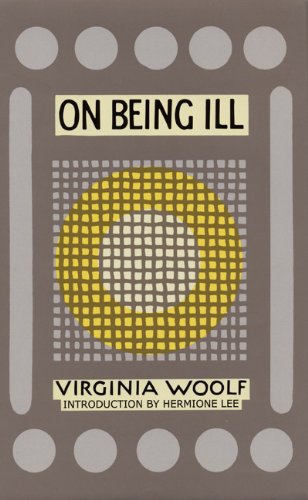 On Being Ill Hardcover – 1 Jan 2002 by
On Being Ill Hardcover – 1 Jan 2002 by
看到有人翻〈論生病〉,我有一點點傷心,因為這篇要歸於論說文,好像有一點點太生硬了,因為明明吳爾芙就她想傳達正在生病的偉大經驗,而我想,她想表達的心意應該大過於要論述的意圖,所以〈生病中〉應該更符合介紹:
In this poignant and humorous work, Virginia Woolf observes that illness is a part of every human being's experience, it has rarely been focus of literature - like the more acceptable subjects of war and love.
難道我們不知道病痛也是愛的偽裝嗎?(好可愛的話)
雖然不想超譯,但是看到吳爾芙《在病中》的文字:Yet it is not only a new language that we need, more primitive, more sensual, more obscene, but a new hierarchy of a temperature of 104; jealousy give place to the pangs of sciatica (坐骨神經痛); sleeplessness play the part of villain, and the hero become a white liquid with a sweet taste.......................
突然覺得波特萊爾的《惡之華》有了全新的意義,因為據資料顯示,他18歲感染梅毒之後,其實可能從來沒有完全好過(天才、狂人與梅毒之謎─上),之前利用文字雲的方式,試圖分析《惡之華》,但是在課堂報告時,我卻對他更原始更感官更情色的詩沒有辦法好好說明(還遭致不以為然的話語),以致覺得很抱歉,甚至,在另一篇報告當中(波特萊爾《惡之華》),好像還是講得不夠,當然,有可能波特萊爾就是要寫,也不在乎後世的解讀,但,身體的不適,果然就如同吳爾芙所說
In health meaning has encroached upon sound. Our intelligence domineers over senses. But in illness, with the police off duty, we creep beneath some obscure poems by Mallarme or Donne, some phrase in Latin or Greek, and the words give out their scent and distil their flavour, and then, if at last we grasp the meanint, it is all the richer for having come to us sensually first, by way of the palate and the nostrils, like some queer odour. Virginia Woolf, On Being Ill
馬拉美 與 多恩 我還不太敢說,但是若是在病榻上讀波特萊爾的詩,大概所有的身體感覺都會大開,甚至會跳起來叫好(這太誇張了),是了,誰能幫病痛說說話呢?病痛何以要躲起來自我傷悲呢?病痛大辣辣的席捲我們,而我們卻無話可說?雖然這些年來有很多幫疼痛說話的書,但是當人在病痛的當下,無法承受之時,誰能體會,我們總是想要有同情心,總是想要被陪伴,總是不能容忍的想要被理解,但要如何得到,不只是從他人處得到,更是希望自己能接受自己,能發揮同情,陪伴別人與自己,理解自己與他人,身體已經在作戰了,我們如何支持身體,不要討厭怨恨丟棄他,給他一些辯白,讓他在作戰累時,更能勇敢當個逃兵,攤在床上,像倒在枯草堆中,讓他喘息,讓他不再覺得那麼痛。
On Being Ill Quotes (https://www.goodreads.com/work/quotes/20203-on-being-ill)
(中文翻譯我很努力了,這裡沒有超譯喔)
Illness is a part of every human being's experience. It enhances our perceptions and reduces self-consciousness. It is the great confessional; things are said, truths are blurted out which health conceals.― Virginia Woolf, On Being Ill
疾病是每個人的經驗的一部分。它增強了我們的認知並減少了自我意識。這是偉大的自白;事情被說出來,那個被健康隱瞞所隱瞞的真相。
We do not know our own souls, let alone the souls of others. Human beings do not go hand in hand the whole stretch of the way. There is a virgin forest in each; a snowfield where even the print of birds' feet is unknown. Here we go alone, and like it better so. Always to have sympathy, always to be accompanied, always to be understood would be intolerable.”
― Virginia Woolf, On Being Ill
我們不知道自己的靈魂,更不用說別人的靈魂了。人類並不會攜手並進。每個人都有一片原始森林。一個甚至鳥的腳印都不會被知道的雪地。在這裡,我們一個人去,而且更喜歡這樣。
Consider how common illness is, how tremendous the spiritual change that it brings, how astonishing, when the lights of health go down, the undiscovered countries that are then disclosed, what wastes and deserts of the soul a slight attack of influenza brings to view, what precipices and lawns sprinkled with bright flowers a little rise of temperature reveals, what ancient and obdurate oaks are uprooted in us by the act of sickness, how we go down in the pit of death and feel the waters of annihilation close above our heads and wake thinking to find ourselves in the presence of the angels and the harpers when we have a tooth out and come to the surface in the dentist's armchair and confuse his "Rinse the mouth-rinse the mouth" with the greeting of the Deity stooping from the floor of Heaven to welcome us - when we think of this, as we are so frequently forced to think of it, it becomes strange indeed that illness has not taken its place with love and battle and jealousy among the prime themes of literature” ― Virginia Woolf, On Being Ill
考慮一下常見的疾病,它帶來的精神變化有多麼驚人,當健康的光線下降,當未被發現的疆域被揭露,流感的輕微攻擊導致了什麼樣靈魂的浪費和荒蕪, 一點上升的溫度揭開了什麼樣的懸崖和草坪上灑滿了鮮花,一個疾病的行動造成了什麼樣古老而頑強的橡樹從我們身體中被連根拔起,當我們因為拔牙而來到了牙醫的診療椅表面,並疑惑他如神一般從天而降的歡迎我們說:“漱漱口吧漱漱口吧”的時候,我們如何在死亡的深淵中墜落,感受到湮沒在我們頭頂的水,而想到在天使與豎琴手面前找到自己 - 當我們想到這個時候,當我們經常被迫想到的那樣,疾病沒有如同愛情,戰鬥和嫉妒一樣在文學中成為主題是多麼其怪的事呢!
Finally, to hinder the description of illness in literature, there is the poverty of the language. English, which can express the thoughts of Hamlet and the tragedy of Lear, has no words for the shiver and the headache. It has all grown one way. The merest schoolgirl, when she falls in love, has Shakespeare or Keats to speak her mind for her; but let a sufferer try to describe a pain in his head to a doctor and language at once runs dry. There is nothing ready made for him. He is forced to coin words himself, and, taking his pain in one hand, and a lump of pure sound in the other (as perhaps the people of Babel did in the beginning), so to crush them together that a brand new word in the end drops out. Probably it will be something laughable.”
― Virginia Woolf, On Being Ill
最後,語言的貧困去阻礙了文學中疾病的描述。 能夠表達哈姆雷特思想與李爾王悲劇的英語,對於顫抖和頭痛毫無用處。 它一切都往一方成長。 最有趣的女生,當她墜入愛河的時候,莎士比亞或者濟慈為她說心裡的話; 但是讓一個患者跟醫生試圖描述他頭腦中的痛苦,語言卻馬上枯竭,沒有為他準備好任何東西。 於是他被迫自行套用文字,把一方的痛苦連接到另一純淨的聲音(就像也許是巴比倫人一開始所做的那樣),把它們壓在一起,而終於跳出一個全新的詞 。這可能會有點可笑。
That illusion of a world so shaped that it echoes every groan, of human beings so tied together by common needs and fears that a twitch at one wrist jerks another, where however strange your experience other people have had it too, where however far you travel in your own mind someone has been there before you - - is all an illusion. ― Virginia Woolf, On Being Ill
這個世界的幻想如此塑造,以至與每個呻吟聲共鳴,以共通的需求與恐懼將人們捆綁在一起,而讓一個抽搐震攝另外一個,無論你的經驗如何奇怪,別人也曾經擁有,無倫在你自己的心中旅有多遠,總有人已經在你前面 - - 都是幻覺。
In illness words seem to possess a mystic quality. ― Virginia Woolf, On Being Ill
在疾病的字眼中,似乎擁有神秘的質量。
Those great wars which the body wages with the mind a slave to it, in the solitude of the bedroom against the assault of fever or the oncome of melancholia, are neglected. Nor is the reason far to seek. To look these things squarely in the face would need the courage of a lion tamer; a robust philosophy; a reason rooted in the bowels of the earth. ― Virginia Woolf, On Being Ill
那些身體用思想作奴隸的大戰,在寢室的孤獨中,對抗著發燒或憂鬱的侵襲,被忽略了。 也不是很遠的原因,要正面看待這些東西需要馴獸師的勇氣; 堅定的理念; 一個根植於地球最深處的理由
We cease to be soldiers in the army of the upright; we become deserters. They march to battle. We float with the sticks on the stream; helter-skelter with the dead leaves on the lawn, irresponsible and disinterested and able, perhaps for the first time for years, to look round, to look up—to look, for example, at the sky. ― Virginia Woolf, On Being Ill
我們不再是軍隊中的正直士兵, 我們成為逃兵。 他們前進戰鬥。 我們用棍棒漂浮在溪流上,倉皇雜亂與枯葉在草地上,不負責任,了無興趣且有才能的,也許是多年來第一次去環顧四周,去往上看,像仰望天空這類的。


 留言列表
留言列表